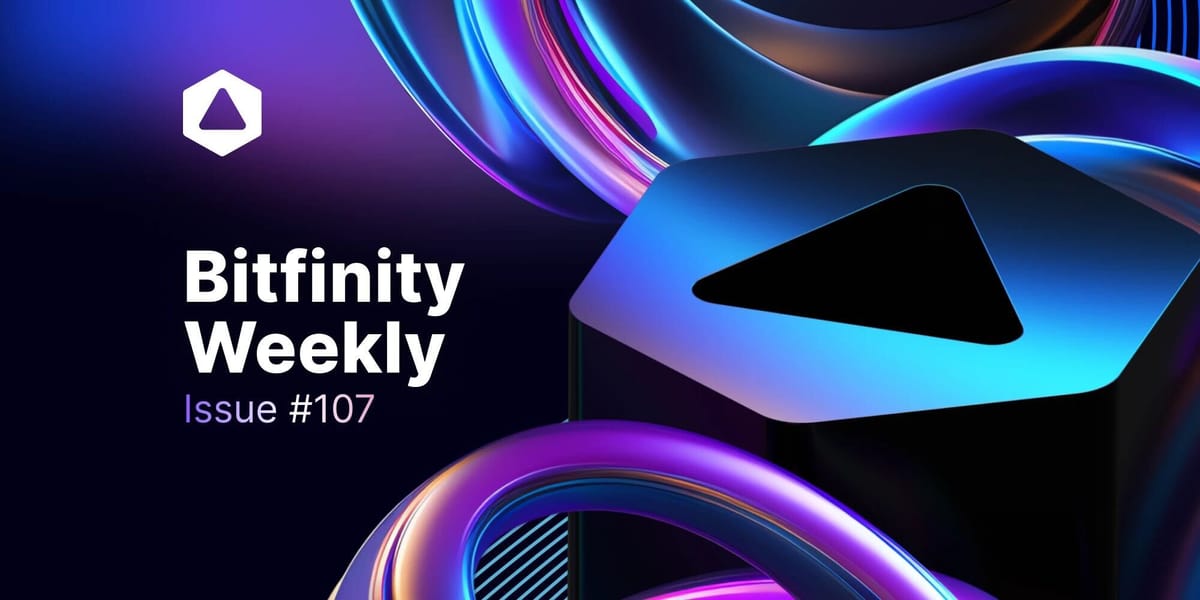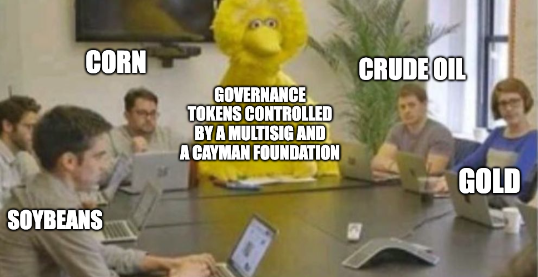Bitfinity Weekly: Playing with Fire

Welcome to Issue #107 of Bitfinity Weekly for our #BITFINIANS community. If this newsletter was forwarded to you, sign up here.
What's in Today's Email?
- Global Crypto News
- This Week in our Blog
- NFT Market Bytes
- Tweet of the Week
- Meme Time
- A Matter of Opinion
Global Crypto News
Playing with Fire: A Solana memecoin dev is currently in the hospital with 3rd degree burns after setting himself on fire for a publicity stunt. The dev's token's concept revolved around taking on bizarre dares as challenges, such as the dev drinking dirty bong water. The fire, which was livestreamed in the token Telegram, quickly got out of control as the dev's friends and brother had only prepared themselves with a few gallons of water and could not extinguish the flames in time before the dev became seriously injured.
Pilot Marines: The world's largest settlement system, the DTCC (Depository Trust and Clearing Corporation), has completed a pilot program with Chainlink, along with several major U.S. banks. The Smart NAV Pilot program aimed to increase the tokenisation of traditional finance fund data by attempting to standardize a method for providing net asset value (NAV) data or funds across blockchains by using Chainlink's Cross-Chain Interoperability Protocol (CCIP).
Completing Syncing: ZkSync, an Ethereum L2 network, announced that the upcoming v24 upgrade will be the final protocol upgrade before network governance is handed over to the community. This transition is expected to be complete by the end of June, at which time a governance token airdrop may be distributed.
FIT Check: The FIT21 bill passed in the U.S. House on Wednesday, potentially bringing the crypto industry one step closer to clearly defined regulatory rules. The Financial Innovation and Technology for the 21st Century Act (FIT21) has been compared to the E.U.'s MiCA, and among other changes, notably increases the jurisdiction of the CFTC (Commodity Futures Trading Commission).
This Week in our Blog
We take a deep dive into one of the most widely used programming languages in web3: Solidity, which is considered essential in the world of smart contracts. In this week's article we break down all the technical essentials you should know:

NFT Market Bytes
Connecting Dots: Internationally renowned contemporary artist Damien Hirst is under scrutiny for potentially misleading investors about the physical pieces behind his NFT collection, "The Currency" series, which he had previously claimed was created in 2016. The 10k collection was launched for sale in 2021, and buyers had the choice of purchasing either a physical or digital version of their desired piece. It has since been alleged by other artists involved in the process that the majority of the artwork was mass-produced in 2019.
Ice Cold: Pudgy Penguins continue to expand their traditional offerings by broadening their retail footprint, this time releasing Pudgy Penguin branded merch via Target stores across the U.S. This move follows last year's successful foray into selling toys at Walmart and discount stores such as Five Below, and the most recent retail expansion into GameStop physical stores just last week.
Super Failed World: Yuga Labs faced significant backlash after revealing the art for Super Punk World, a collaborative NFT collection between the web3 IP giant and contemporary artist Nina Chanel Abney. Both CryptoPunks and the larger crypto community rallied against the collection, criticizing it for disrespecting crypto culture as well as being an extractive derivative 'grift'. Within less than 24 hours of the online reveal, Yuga Labs released a statement saying that the CryptoPunks IP would be held in stewardship only from now on.
Tweet of the Week
Want to build custom Bitcoin solutions?
— Bitfinity Network (@bitfinitynet) May 21, 2024
Explore Bitfinity Network's open-source SDKs to create your own Bitcoin integrations and wallets!
Check them out here 👇 to get started on testnet 🌐https://t.co/uj9d6BLzVI pic.twitter.com/dK5ctU8Fpj
Calling all Bitcoin builders!
Meme Time

A Matter of Opinion
The recent passage of the Financial Innovation and Technology for the 21st Century Act (FIT21) by the U.S. House of Representatives is a significant step forward for better defined regulation of digital assets. As the world's largest economy grapples with the rapid evolution of cryptocurrencies, the FIT21 bill promises a structured and comprehensive framework aimed at resolving regulatory ambiguities and fostering innovation in the sector.
However, the bill's journey through the Senate and the broader political landscape reveals the complex interplay of innovation, regulation, and political maneuvering. Furthermore, some critical voices in crypto are questioning if the changes proposed in FIT21 are actually good for the industry, or will lead us down a path of even more unclear regulation which effectively bars regular retail investors from participating, much like the traditional finance world is closed off to regular, every day Americans.
The FIT21 bill, a Republican-led initiative, garnered bipartisan support in the House, notably from Democrat mainstay and figurehead Nancy Pelosi. This support underscores a growing recognition across party lines of the need for clear and robust regulatory guidelines for digital assets. The bill aims to delineate the roles of the Commodity Futures Trading Commission (CFTC) and the Securities and Exchange Commission (SEC), ending the jurisdictional "food fight" that has hindered the development of cohesive crypto regulations.
The FIT21 bill's provisions offer much-needed clarity by defining crypto assets and allocating oversight responsibilities between the CFTC and the SEC. This structure is designed to facilitate industry growth while ensuring regulatory oversight is balanced and appropriate. Importantly, the bill grants the CFTC, perceived as more industry-friendly, greater jurisdiction over the digital assets sector, while the SEC retains authority over securities. This delineation could foster a more predictable regulatory environment, encouraging innovation and investment. However, as some crypto-native experts in law have pointed out, this could also very well be a Trojan horse that hands even control over to the government.
Connect with Bitfinity Network
Bitfinity Wallet | Bitfinity Network | Twitter | Telegram | Discord | Github

*Important Disclaimer: While every effort is made on this website to provide accurate information, any opinions expressed or information disseminated do not necessarily reflect the views of Bitfinity itself. The information provided here is for general informational purposes only and should not be considered as financial advice.






Comments ()